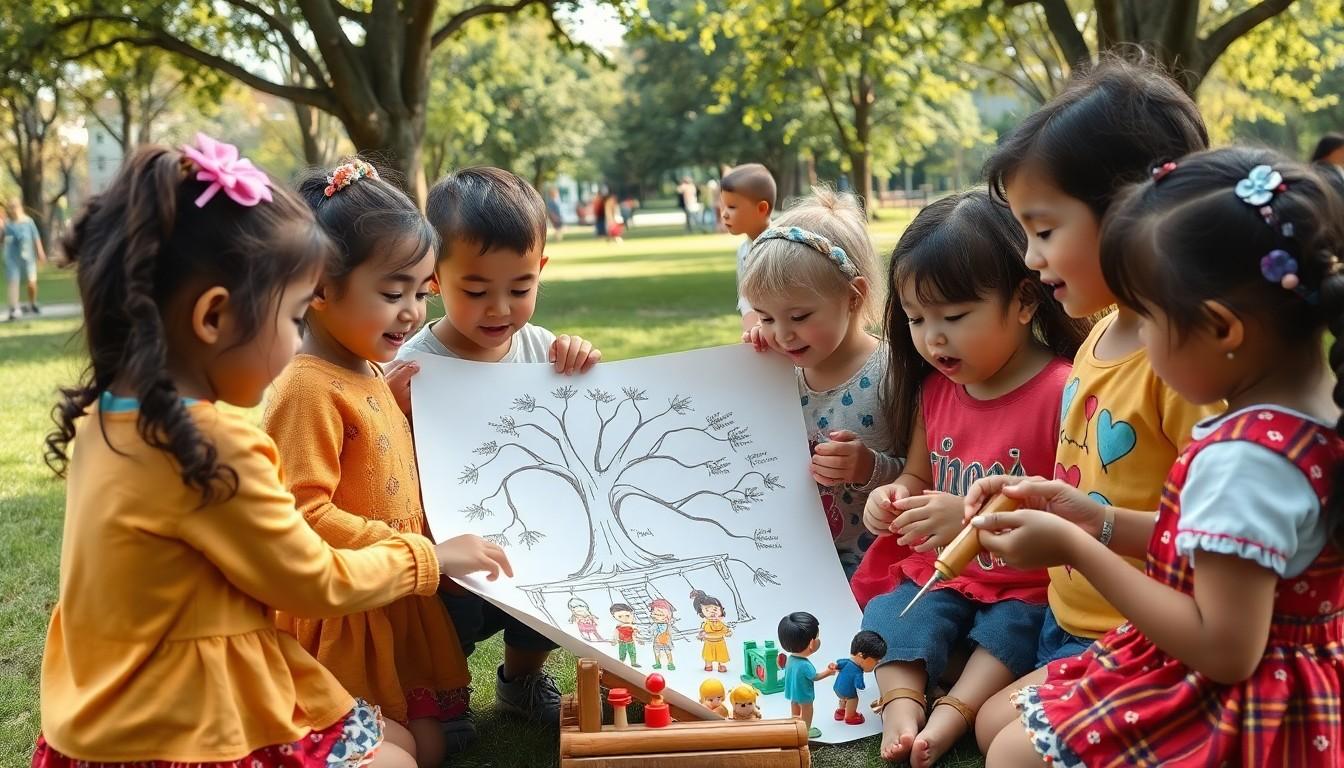Imagine a world where tiny explorers embark on grand adventures from the comfort of their classrooms. Social studies for preschoolers opens the door to this exciting journey, helping little ones discover their place in a big, bustling society. Through playful activities and engaging stories, they learn about cultures, communities, and the importance of friendship—all while having a blast!
Table of Contents
ToggleImportance Of Social Studies For Preschoolers
Social studies play a crucial role in helping preschoolers understand their surroundings. Engaging with this subject nurtures curiosity and promotes an awareness of the world around them.
Developmental Benefits
Social studies contribute significantly to preschoolers’ cognitive development. They learn to think critically about their environment and begin to recognize connections between themselves and others. Enhanced communication skills emerge as children discuss different cultures and communities. Exposure to diverse perspectives fosters empathy and strengthens their capacity for problem-solving. Furthermore, integrating fun activities deepens their understanding of basic concepts, making learning enjoyable and memorable.
Fostering Social Skills
Social studies actively fosters important social skills in preschoolers. Collaborative group activities encourage teamwork and cooperation, allowing children to learn the value of sharing and listening. Engaging in discussions about friendship and community creates opportunities for them to express their feelings. Children build confidence when sharing personal experiences and viewpoints, developing their ability to articulate thoughts. Additionally, role-playing activities promote understanding of social roles, further enhancing their interpersonal skills.
Key Concepts In Preschool Social Studies

Preschool social studies introduce key concepts that shape children’s understanding of their environment. Engaging themes encourage exploration of family, community, and cultural diversity.
Family And Community
Understanding family and community lays a strong foundation for preschoolers. Children learn about their own families, exploring roles and relationships. In addition, activities like drawing family trees and sharing stories foster connection. Engaging with their communities enhances children’s awareness of local resources and landmarks. They can participate in community events, which promote belonging and responsibility. Learning about various occupations helps preschoolers recognize the diversity in their surroundings. This knowledge enriches their social interactions and builds empathy.
Cultural Awareness
Cultural awareness broadens preschoolers’ horizons. They discover different customs and traditions through stories, music, and art from around the world. Activities such as cooking traditional meals or celebrating global festivals immerse them in diverse cultures. These experiences cultivate appreciation and respect for others’ backgrounds. Understanding various perspectives promotes inclusivity and teamwork among peers. Engaging with different languages and greetings encourages curiosity. Overall, cultural awareness fosters a sense of global community, making preschoolers more adaptable and culturally sensitive.
Effective Teaching Strategies
Effective teaching strategies enhance social studies for preschoolers, helping them grasp essential concepts while engaging with their environment.
Interactive Learning Activities
Interactive learning activities spark curiosity and encourage exploration. Circle time discussions promote sharing experiences, creating connections among peers. Field trips provide hands-on opportunities to observe community resources. Dramatic play areas allow role-playing various societal roles, boosting confidence and understanding. Art projects, such as making maps or collages, foster creativity while illustrating cultural diversity. Storytime sessions using diverse books expand perspectives and enhance comprehension. Incorporating community helpers, such as firefighters or police officers, enriches children’s understanding of local roles, nurturing a sense of safety and trust.
Incorporating Play-Based Learning
Incorporating play-based learning makes social studies engaging. Learning through play captures preschoolers’ attention and fosters imagination. Activities like puppet shows can present cultural stories, allowing children to express emotions and learn empathy. Building blocks serve as tools for creating community structures, enhancing spatial awareness and teamwork. Outdoor games encourage negotiation skills and cooperation. Cooking activities introduce culinary traditions, promoting sensory experiences and healthy choices. Each of these experiences promotes collaboration and strengthens social skills, equipping preschoolers with a comprehensive understanding of their world.
Resources For Teaching Social Studies
Teaching social studies to preschoolers benefits from diverse resources that enhance engagement and understanding. Effective materials include books, literature, and digital applications that offer immersive learning experiences.
Books And Literature
Books form an essential resource for teaching social studies. Thematic picture books introduce concepts such as community, family, and cultural diversity. Titles like “All Are Welcome” by Alexandra Penfold and “Whoever You Are” by Mem Fox promote inclusivity and understanding. Storytime becomes an opportunity to explore various social themes through engaging narratives. Readers can also encourage discussions about characters’ experiences, allowing preschoolers to relate to different perspectives. Finding books with rich illustrations captivates young imaginations and reinforces essential social studies concepts.
Online Tools And Applications
Digital tools can enhance preschool social studies lessons. Interactive applications offer fun activities, games, and videos that explore cultural traditions and community roles. Websites like PBS Kids and National Geographic Kids provide educational resources tailored for young learners. These platforms emphasize exploration and curiosity through visual storytelling. Online tools can supplement classroom learning by enabling preschoolers to engage with cultural festivals worldwide. Using these applications ensures a dynamic learning environment that caters to a digital-savvy generation while fostering cultural awareness and appreciation.
Conclusion
Introducing social studies to preschoolers is vital for their growth and understanding of the world around them. Through engaging activities and interactive learning, children develop essential social skills and a sense of community. They learn to appreciate cultural diversity and build empathy for others, laying a strong foundation for future learning.
By incorporating playful experiences and diverse resources, educators can create a dynamic environment that fosters curiosity and critical thinking. This approach not only enhances children’s cognitive abilities but also nurtures their emotional intelligence. As preschoolers explore their roles within their communities, they become more aware and adaptable individuals ready to embrace a global society.


